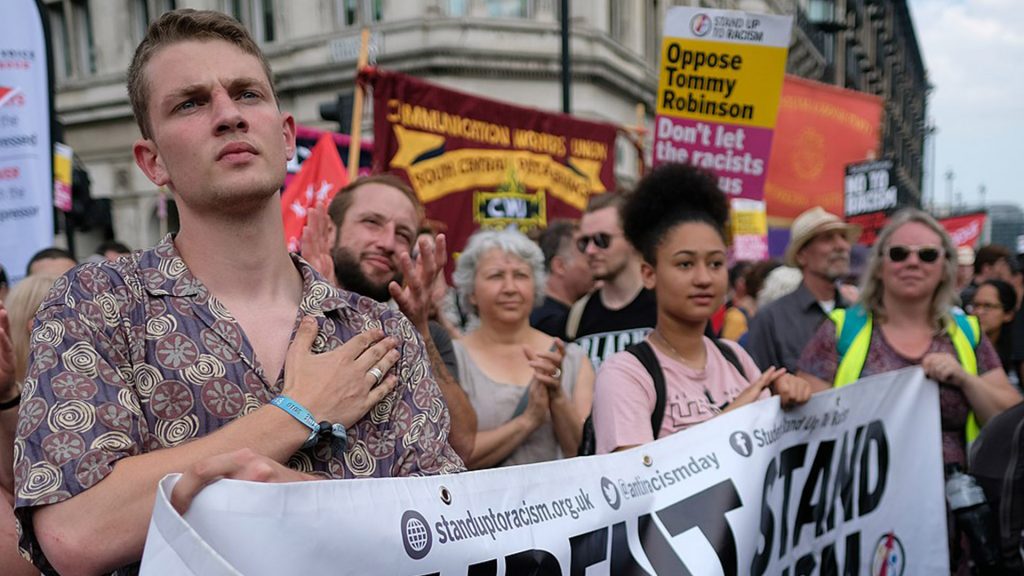The phenomenon of ‘cancel culture’ has made headlines around the world in the last few years, with ‘woke’ mobs supposedly shutting down organisations, people and ideas that they believe are not politically correct. At the centre of the media furore is the fear that the western world is experiencing a free speech crisis. Concerns have been voiced from across the political spectrum, with comparisons made to Orwell’s 1984, Stalinism and the Taliban.
Universities are a focal point for these worries. Students are depicted simultaneously as fragile, risk-averse ‘snowflakes’ and heavy-handed ‘social justice warriors’. They are to be both pitied and feared. Conservatives, libertarians and liberals in the UK, United States, Canada, Australia and New Zealand have all expressed alarm about ‘cancel culture’ on university campuses. They claim that students and academics are increasingly afraid of (or uninterested in) debate and unwilling to be challenged by controversial ideas. For example, in 2015, Nick Cohen wrote in The Guardian: ‘Rather than being free institutions where the young could expand their minds, British universities were becoming “theological colleges” where secular priests enforced prohibitions.’
The populist and far right have taken up the free speech battle with gusto. Nigel Farage of the Brexit Party spoke to the Young America’s Foundation last year, branding students who banned speakers from university debates as fascists:
I mean frankly, the real fascism these days, the real intolerance isn’t Matteo Salvini or Donald Trump, it’s those on the left who wish to shout down the other side and indeed on campuses like this, across America and across the whole of the UK, attempt to no platform speakers who’ve got ideas they don’t like. That’s the real modern fascism: the attempt to close down free speech.
How much evidence is there that a free speech crisis exists? In 2018, a parliamentary inquiry by the Joint Committee of Human Rights suggested that controversial episodes have grabbed the headlines while actually being far and few between. It concluded that there were some incursions on ‘lawful free speech’ on campus, but ‘did not find the wholesale censorship of debate which media coverage has suggested’.
Free speech is a value worth defending. But if the phenomenon is being blown out of proportion, who stands to benefit? For the far right, the notion of a free speech ‘crisis’ is actively useful. Racist and misogynistic figures such as co-founder of the English Defence League Tommy Robinson, or alt-right personality Milo Yiannopoulos, have successfully portrayed themselves as defenders of free speech against the politically correct elites. The far right have used the media furore to argue that the left has come to dominate higher education and civil society, and that only they are able to combat this. As political economist and sociologist William Davies has written:
the very notion of ‘free speech’ has become a trap. Neo-fascist or alt-right movements now use it to attack alleged ‘political correctness’, using the principle of free expression to push hateful and threatening messages towards minority groups … Whereas intellectual freedom was once advanced in Europe as the right to publish texts that were critical of the establishment, it has now become tied up with spurious arguments surrounding the ‘right to offend’.
The free speech absolutism celebrated by some right-wing and right libertarian commentators and politicians, including those in the political mainstream, has thus enabled the far right. Meanwhile, the free speech ‘crisis’ has become a lucrative industry, generating a number of books, countless media articles and dozens of television and radio appearances.

Photo by Students Stand Against Racism – Alisdare Hickson from Canterbury, United Kingdom, CC BY-SA 2.0 via Wikimedia Commons
The policy and tactic of ‘no platforming’ is at the heart of this debate. ‘No platform’ is, at its core, a policy instituted by the National Union of Students (NUS) in the UK that allows student unions to withhold resources and access to union-run spaces and funds from fascist and racist organisations and speakers, as well as disinvite these speakers if invited by other student groups. It may also involve protest activities that attempt to prevent these people from speaking on campus, such as pickets or disruption of speakers (although the latter is not actually supported by the NUS).
The idea behind banning certain speakers and subjects from public debate is not controversial in itself: the reality is that not all ideas and opinions are equally valid and deserving of a public platform. It is the norm for certain forms of speech, like hate speech, to be proscribed by law. Speech does not exist in a bubble and allowing hateful ideas and opinions to be publicly expressed opens up the possibility of these ideas being translated into actions.
Various campaigns, both online and on the streets, have opposed the media platforms given to far-right politicians like Farage or Robinson (or controversialists like disgraced columnist Katie Hopkins). Yet there is a prevailing view that in a free society, extreme views on race, gender, homosexuality and trans rights (amongst other things) should, in the spirit of debate, be allowed to be heard, regardless of their offensiveness or inaccuracy.
When it comes to universities, the debate is even more heated. For many liberals and right-wing thinkers, universities occupy a dual role. On one hand, they are the physical manifestation of the marketplace of ideas, where concepts are interrogated. The university debating societies that emerged in the late Victorian era and first half of the 20th century still influence perceptions of the university, where all ideas are to be heard and debated. On the other hand, since the emergence of the student movement in the mid-to-late 1960s, universities have been viewed as a site of subversion and political extremism, even though neoliberal reforms over the last 35 years have drastically changed the university and the student body within it.
Universities as the site of intellectual inquiry have therefore become a much-desired venue for the far right, who use the arena of debate to legitimise their objectionable ideas.
This dynamic has a long history. Going back to the 1930s, Oswald Mosley’s British Union of Fascists proclaimed that they were the only ones who could protect the democratic right to free speech from the communists, with a presence at several universities. Throughout the late 1950s and early 1960s, Mosley was invited by student groups, including the Oxford and Cambridge Unions, to speak on issues including apartheid in South Africa, decolonisation and nuclear disarmament.
A number of those that invited Mosley claimed that he brought a provocative and lively aspect to the proceedings, and praised his oratorical skills. While they propagated the principle of free speech, the publicity around his appearances may have also been persuasive. Mosley believed that he had been denied his rightful place in British political leadership. By hosting him, these student groups reinforced his ego – and he relished the controversy.
It is relatively straightforward to make the argument that an openly fascist figure like Mosley should not be given a platform. The issue becomes complex when it involves more mainstream figures. The National Union of Students introduced the ‘no platform’ policy in 1974. At that point, the Labour government refused to intervene in student union politics, even though it disagreed with the NUS.
In the 1970s and 1980s, debate raged over university Conservative associations inviting rightwing MPs to speak – such as John Carlisle, who was pro-apartheid, or Enoch Powell, known for his inflammatory speeches against immigration. These protests led to the Thatcher government introducing legislation to compel universities to ensure freedom of speech on campus in 1986.
It did not have the desired effect, largely because the student unions argued that the new law did not apply to them as they were separate legal entities. This stance has been contested for the last 30 years. The current Education Secretary, Gavin Williamson, is now pursuing a change in the law that would seek to address this gap.
Although universities have long been a hub for this battle, it was never limited to campuses. In the 1970s and 1980s, the National Front campaigned that the Public Order Act 1986 and Race Relations Act 1976 hindered their free speech, saying this was an establishment conspiracy. Under Nick Griffin in the 2000s, the British National Party portrayed itself as the ‘party of free speech, unlike the mainstream parties, in defiance of political correctness’.
In recent years, the moral panic about the alleged lack of free speech on campus has once again come to the fore. Universities across the country have seen Free Speech Societies (or similar) inviting controversial speakers as an act of rebellion against the ‘no platforming’ policy.
In 2007, the Oxford Union invited Nick Griffin to debate alongside the Holocaust denier David Irving, at the height of the BNP’s electoral success and efforts to be seen as a more ‘respectable’ party. Despite much uproar from students, the event went ahead.
In the intervening years, the Oxford Union has invited a number of far-right speakers to take part in debates, such as Tommy Robinson, Katie Hopkins, Steve Bannon and Marine Le Pen. These invitations from a prestigious debating club have been used by the far right to further legitimise their ideas. Journalist Hsiao-Hung Pai quoted Robinson as saying:
When we were talking about these issues five years ago, we were shunned and called racists. Now, in the last 12–18 months, they, the politicians and media, are all talking about the same issues. My speech at the Oxford Union was very well received. These ideas become more mainstream. People are listening to us now.
This far-right opportunism can also take the form of hijacking student bodies. At Leeds University in 2001, two young BNP members, Mark Collett and Chris Beverley, took over the university’s Free Speech Society and began campaigning for the overturn of the student union’s ‘no platform’ policy. The former treasurer of the society, who left when Collett took charge, wrote in the student newspaper that while they personally agreed with the opposition to ‘no platform’, under Collett the society ‘no longer stood for free speech in action, it only stood for the abstract right of racists to speak freely, minus criticism.’
Students have argued for ‘no platforming’ of the far right and other purveyors of hate speech since the 1970s in order to prevent the legitimisation of their ideas. Entering into a dialogue with or providing a platform for the proponents of hateful speech gives the impression that these ideas can be reasonably debated. Although the far-right appeal to liberal ideals of free speech, they use these ideals to undermine progressiveness, liberalism and democracy as a whole.
There is clearly a discussion to be had about some of the applications of no platforming, particularly when it comes to mainstream elected politicians. For example, in March, former Home Secretary Amber Rudd claims she was ‘no platformed’ by an Oxford University society. (Her invitation was withdrawn by the UN Women Oxford UK society after a vote relating to her role in the Windrush scandal.)
However, as the 2018 parliamentary report found, instances of overreach do not add up to the ‘crisis’ that we hear so much about: figures from across the political spectrum still speak at universities, and those who are ‘no platformed’ by a university society still have access to other speaking events, or in some cases to national TV appearances and newspaper columns.
While the university is a place of intellectual inquiry, hate speech should be wholeheartedly rejected. The marketplace of ideas is driven not only by what is reasonable, but also by a desire for sensationalism. Allowing harmful and hateful speech a public platform drives the discourse towards further extremes. Media panic around a free speech ‘crisis’ may disarm the liberal centre, but it is the far right that ultimately stands to gain.







